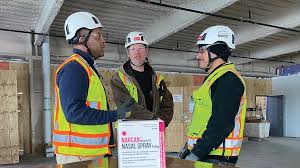
HARRISBURG, Pa. — Pennsylvania’s construction industry, which has long battled high rates of substance abuse, is getting new support from state lawmakers who hope to turn awareness into action. This week, the state Senate designated July 21–25 as “Construction Opioid Awareness Week”, aiming to shine a spotlight on the sector’s ongoing struggle with opioid misuse right as summer building activity peaks.
The official recognition came through Senate Resolution 133, sponsored by State Sen. John I. Kane — a seasoned plumber and labor advocate who now serves as the minority chair of the Senate Labor & Industry Committee. The resolution was co-sponsored by Sen. Devlin Robinson, chair of the committee, and Sen. Tina Tartaglione.

“As someone who spent decades in the construction trades, I’ve witnessed firsthand the devastating impact of opioid addiction on our workforce,” Kane said in a statement announcing the resolution. “I’ve lost friends, colleagues, and community members to this epidemic. This isn’t just policy for me — it’s personal.”
The Senate’s move encourages contractors, unions, and industry groups to amplify education and prevention efforts during one of the busiest — and often riskiest — times of the year for jobsite injuries and painkiller prescriptions.
The construction industry’s connection to opioid misuse is widely documented. Physically demanding work, a high rate of injuries, and sometimes inconsistent access to healthcare have all contributed to high levels of prescription painkiller use. According to a 2023 Centers for Disease Control and Prevention report, construction and extraction occupations had the highest overdose death rates of any occupation — 162.6 deaths per 100,000 workers — during the first year of the COVID-19 pandemic.
However, lawmakers pointed to encouraging signs that targeted interventions can make a difference. Nationwide drug overdose deaths fell from 110,037 in 2023 to 80,391 in 2024, according to the Senate’s announcement — progress advocates hope to build on.
Senate Resolution 133 calls on construction employers and workers to do more than just talk about the issue. It encourages companies to:

Fifteen industry groups are rallying behind the initiative, including the Keystone Contractors Association, the Pennsylvania Building and Construction Trades Council, the Eastern Atlantic States Regional Council of Carpenters, and the General Building Contractors Association.
The Keystone Contractors Association is among the organizations directly helping contractors by offering free naloxone to any Pennsylvania construction firm that requests it — a practical lifeline that has already saved lives on job sites across the state.
Pennsylvania’s new awareness push joins a broader national effort to address the unique challenges the construction workforce faces in the fight against opioids and substance abuse. Similar initiatives in states like Ohio, Massachusetts, and West Virginia have combined jobsite education with free overdose prevention supplies and stronger mental health supports.
By linking legislative action with on-the-ground resources, Pennsylvania lawmakers hope this summer’s campaign will not only honor those lost but help prevent future tragedies. As Kane put it, this week is about more than proclamations: it’s about protecting the people who build the state’s homes, roads, bridges — and future.
Originally reported by Matthew Thibault in construction Dive.